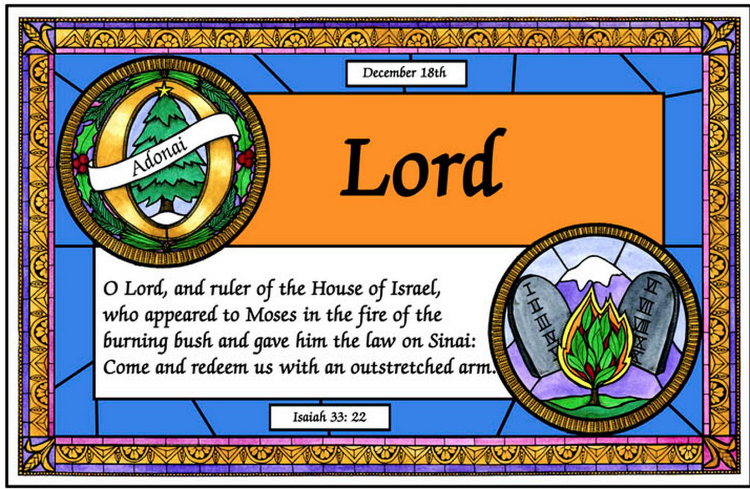From Catholic News Agency:
The O Antiphons invoke Our Lord using imagery taken from the Old Testament: “O Wisdom From on High”; “O Lord of the House of Israel”; “O Root of Jesse’s Stem”; “O Key of David”; “O Radiant Dawn”; “O King of the Nations”; and “O Emmanuel.” To these biblical images are added various pleas such as: “Come to teach us the path of knowledge!”; “Come to save us without delay!”; and “Come and free the prisoners of darkness!”
Each of these O Antiphons is a beautiful prayer in itself, but each also demonstrates exactly how the Church has come to understand Christ’s relationship to the promises and images of God so prevalent in the Old Testament....
Perhaps a more poignant instance of a powerful Old Testament image of the divine is the Dec. 18 antiphon: “O Lord of the House of Israel, giver of the Law to Moses on Sinai.” The events recounted in the Book of Exodus are magnificently tremendous, from the burning bush to the parting of the Red Sea to the giving of the Law to Moses at a Mount Sinai covered in thunder and lightning.
The Church Fathers routinely noted Christ’s presence in God’s various manifestations to the Israelites. St. Justin Martyr recalled: “The same One, who is both angel and God, and Lord and man, and who appeared in human form to Abraham and Isaac, [also] appeared in a flame of fire from the bush and conversed with Moses.”
St. Gregory of Nyssa comments on the events of the desert — the clouds, the thunder, and the tabernacle of God’s presence — “Taking a hint from what has been said by Paul, who partially uncovered the mystery of these things, we say that Moses was earlier instructed by a type in the mystery of the tabernacle which encompasses the universe.” This tabernacle, Christ the Son of God, he continues, “is in a way both unfashioned and fashioned, uncreated in preexistence but created in having received this material composition.”
The preexisting Eternal Son of God who is the perfect image of God is also the presence of God in the flaming bush, on Mount Sinai and perfectly in his incarnation.


Bit he already did. I notice in both Anglicanism and Catholicism, and Eastern Orthodoxy too, the prayers ask God to do what he already did. Prayers like "give us the Holy Spirit" being prayed by baptized Christians who already received the Holy Spirit, etc. There is a childishness and lack of memory to theae traditions.
ReplyDelete...an excerpt from 'The Catholic Church has the answer' by Paul Whitcomb;
ReplyDelete'Why do Catholics try to earn their own salvation, despite the fact that salvation can only come as a free gift from Jesus Christ?'
....Catholics fully recognize that Jesus Christ died on the Cross for their sins and thus 'opened the gates of Heaven,' .... receiving Christ's saving and sanctifying grace, and Christ Himself into their soul at baptism, yet there are certain conditions for entry into eternal happiness in Heaven, for example, receiving His true Flesh and Blood (John 6:54), and keeping the commandments (Matt. 19;17). If a Christian refuses or neglects to obey Our Lord's commands in a grave matter (mortal sin), Our Lord will not remain dwelling in his soul; and if a Christian dies in that state, he will not be saved.
St. Paul warned 'they who do such things shall not obtain the kingdom of God' (Gal. 5:21)
It must be added; Christ will always forgive and return to sinner who approaches Him with sincerity in the Sacrament of Penance (confession). Paul did not think that salvation was guaranteed once and for all 'I chastise my body, and I bring it into subjection; lest perhaps when I have preached to others, I myself should become a castaway.' (1 Cor. 9:27).
Also: 'With fear and trembling work out your salvation. For it is God who worketh in you.....' (Phil. 2:12-13). 'And unto whomsoever much is given, of him much shall be required.' (Luke 12:48). 'He that shall persevere unto the end, he shall be saved.' (Matt. 10:22).
'For the Son of man....will render to every man according to his works.' (Matt. 16:27)
St. Irenaeus, one of the most illustrious of the primitive Christian Fathers: 'For what is the use of knowing the truth in word, while defiling the body and accomplishing the works of evil? Or what real good at all can bodily holiness do, if truth be not in the soul? For these two, faith and good works, rejoice in each other's company, and agree together and fight side by side to set man in the Presence of God.' (Proof of the Apostolic Preaching).
Justification by faith alone is a new doctrine; it was unheard of in the Christian community before the 16th century.
Thank you so much for this. It explains things so well.
DeleteMost interesting explanation of the Noahide Laws.
ReplyDeletehttps://www.youtube.com/watch?v=T0RDmbKwnOs&t=4103s
..... while listening please keep your mind, and heart on the Body of Jesus Christ on the Cross.
St. Paul says, “…but we preach Christ crucified…” (1 Cor. Chp.1, 23).
1 Cor 2:2, “For I decided to know nothing among you except Jesus Christ and Him crucified.”
Why does Paul preach Christ crucified? Doesn’t he know Jesus has been raised from the dead? Of course he does! But he knows that it is through the power of the crucified Christ on the cross that the bonds of sin and death are broken. As he says in verse 24, Christ crucified is the “power of God.”
The presentation attempts to provide a metaphysical explanation of N-o-a-h-i-d-e Laws, and the larger project, in particular, the sub-law: S-a-n-h-e-d-r-i-n (57--A), which entails the e-x-e-c-u-t-i-o-n-s of Christians be means of b-e-h-e-a-d-i-n-g.